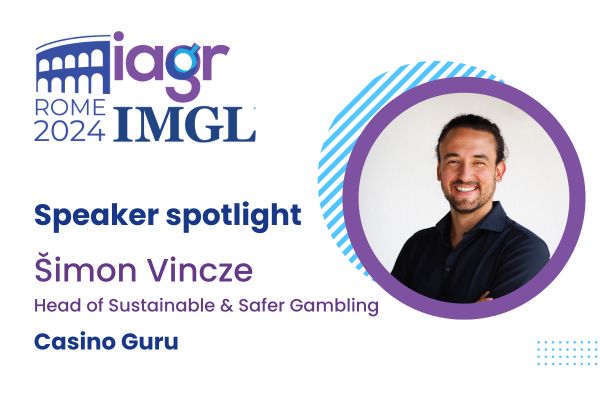
Speaker spotlight: Šimon Vincze
Enhancing the effectiveness of online self-exclusion
Guest article by Šimon Vincze, Head of Sustainable & Safer Gambling, Casino Guru
Self-exclusion is one of the most widely adopted responsible gambling features in the online gambling industry. According to data from Casino Guru’s database of over 6,000 online casinos, more than 85% offer some form of self-exclusion to their players. A significant portion of these casinos offer this feature voluntarily, without regulatory requirement, making self-exclusion a substantial industry standard. However, the details of how self-exclusion is implemented and managed can vary significantly between operators, which can negatively impact its effectiveness for both players and operators as well.
In the past 12 months, almost $300,000 has been returned to players due to complaints related to ineffective self-exclusion implementation or operators’ reluctance to keep accounts closed. These numbers come from Casino Guru’s Complaints Resolution Centre, which handles disputes between players and online casinos. Most of these cases involve jurisdictions with either no or unspecific requirements for self-exclusion practice. Without clear guidelines, license holders tend to implement what is most convenient for them, which is not always aligned with an effective process of self-exclusion.
Even modern regulations lack uniformity in detail. Jurisdictions tend to set their own rules regarding the duration of self-exclusion, how it is initiated and terminated, as well as the responsibilities of both players and operators due to entry into self-exclusion schemes. This causes uneven levels of protection across different jurisdictions, making it difficult to compare self-exclusion practices meaningfully. Furthermore, many operators are active across multiple jurisdictions, which can create confusion and misunderstanding for players, especially in yet-to-be-regulated markets.
The Self-exclusion Standards project aims to change these issues by focusing on the discussion of best practices for online self-exclusion among industry stakeholders. Led by Dr Margaret Carran from City, University of London, this project aims to produce a set of recommendations resulting from a thorough methodology consisting of research, fact-finding, collaboration within the project workgroup, and broader consultation with online gambling stakeholders.
The workgroup represents the imperative part of the project as it brings together diverse expertise across all stakeholders, three different continents, lived experience, and a layperson. The workgroup’s task was to find agreement on various aspects of self-exclusion, drawing on both its expertise and existing research on self-exclusion. The findings are now subjected to a broader consultation, allowing additional companies to provide feedback that will shape the final recommendations.
Initial findings, including results from broader consultation, will be presented on the second day of the IAGR and IMGL Rome conference. Attendees will have the opportunity to hear firsthand recommendations on key areas, such as the timing and responsibility of account blocking, automatic deposit transfers, account reopening, initiation of self-exclusion, or implementation of a panic button.
The broader consultation will remain open until the end of the year, after which the workgroup will finalize the recommendations. The final paper will be released in February, and its findings will be publicly available to any organisation interested in revisiting and potentially enhancing its self-exclusion practices.
You can respond to broader consultation here.
Šimon Vincze and Dr Margaret Carran will present at the IAGR and IMGL joint Rome conference on 22 October. Their session is titled Best Practice Self-Exclusion Standards.





